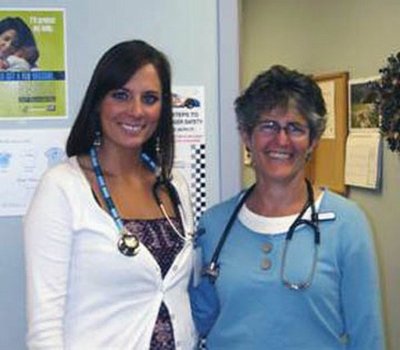April 8, 2010
TRUST recruits and prepares medical students for service in rural and underserved areas
The recent passage of federal health care reform legislation begs the question: Will there be enough primary-care physicians and high-need specialists to meet the increased demand?
The UW School of Medicine has launched the Targeted Rural-Underserved Track (TRUST) program to recruit and train more medical students for careers in primary care and high-need specialties, such as general surgery and obstetrics and gynecology. UW medical students in the track prepare to serve in rural and medically underserved areas in the WWAMI (Washington, Wyoming, Alaska, Montana and Idaho) region. TRUST connects underserved communities, the UW School of Medicine, and residency programs in efforts to meet the health workforce needs of the region.
The TRUST co-directors are Dr. Suzanne Allen, UW Medicine vice dean of regional affairs, and Dr. Tom Greer, UW Medicine professor of family medicine and director of medical student programs, Department of Family Medicine.
“Our goal is to increase the number of medical students who choose residencies in primary care or other needed specialties, and to increase the number of those who want to practice in rural and underserved areas throughout the WWAMI region.” said Greer.
The TRUST program creates an integrated pathway for medical students interested in rural or underserved medicine. The program builds on the successes of the School of Medicine’s existing programs that give students experience working with these populations, including Rural/Underserved Opportunities Program (R/UOP), WWAMI Rural Integrated Training Experience (WRITE) program, and the Underserved Pathway, which provides a curriculum and training on health issues affecting migrant workers, people who are homeless or improverished, and other populations lacking adequate health care, as well as the chance to do policy research.
The TRUST program creates a continuum that begins by selecting students who desire to practice rural or underserved medicine and then educating and supporting them in this career interest throughout medical school.
Selected students participate in a clinical experience before starting medical school, take specific TRUST courses, and are required to participate in R/UOP and WRITE. During the summer after their first year of medical school, R/UOP places them one-on-one with a physician practicing in a rural or inner city location. WRITE enables students further along in their medical education to train with a rural doctor for five months.
The TRUST students also have at least two faculty mentors — one from their home region and one from the School of Medicine’s College system. The program then will assist students with placement into rural- and underserved-focused residency programs, with the eventual goal of having new physicians practice in these areas of need.
Montana was the first state to implement the program in 2008; Eastern Washington was added as a TRUST site in 2009. About five TRUST students per state are admitted each year.
The program receives federal funding from the U.S. Department of Health and Human Services, Health Resources and Services Administration under an Academic Administrative Units in Primary Care grant. The funding comes under the Public Health Service Act, Title VII, Section 747.
The program is administered through the UW Department of Family Medicine and the Montana and the Eastern & Central Washington regional offices of the WWAMI program. For more information, visit the TRUST program web site.
See also “Why We Care About Primary Care” in the latest issue of UW Medicine, a magazine for alumni and friends of the UW School of Medicine.


